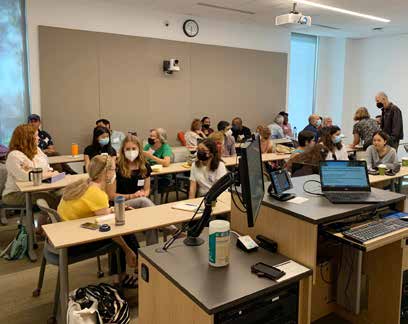
Rice University’s Center for Environmental Studies (CES) has funded five new research projects with Bayou City Waterkeeper. That organization has developed new tools for studying wetland ecosystems and Houston’s sewage system, creating story maps and tool kits to explore the dangers facing the ecosystems and the lack of good infrastructure in the Greater Houston region.
In addition to the research projects, CES organized summer internships with Air Alliance Houston and Citizens’ Environmental Coalition. Through this inaugural program, Rice students were able to gain firsthand knowledge of how nonprofit organizations function and managed to use the skills they learned in the classroom. CES interns helped plan and participate in the first Houston Climate Summit, which drew more than 200 local activists and environmental leaders to Rice this fall.

This semester, speakers from partner organizations connected with students interested in getting actively involved with helping the environment and fighting climate change. Through these partnerships, Rice students are given new opportunities to expand their knowledge and hands-on experiences.
Additionally, students from across the university visited the Houston Climate Justice Museum’s satellite exhibit in the center’s on-campus solar studios space. In the spring semester, the museum will be exhibiting “Creosote Stories: Seeding Planthropocenes in Northeast Houston.”
Also, this coming spring, the center is presenting two events about the food we eat and where we live. CES will be launching a Food Justice lab, which will culminate with an event focusing on local farmers and chefs, encouraging the Rice community to learn where food comes from and how it is made. Additionally, in partnership with Rice Cinema, CES will host the premiere of Public Health Watch’s new documentary on air pollution in Harris County, “Smells Like.”

Finally, CES continues to serve as a bridge between local organizations and the Rice community. This fall, CES held its first Gulf Coast Connections, which gathered 50 academics, artists and nonprofit leaders from Houston and New Orleans at Rice to talk about collaborative urban research, community engagement, environmental artmaking and best practices for pedagogy. This event helped develop and strengthen partnerships across the region to build a healthier Gulf Coast.
Diluvial Houston Initiative, which is part of CES, was instrumental in securing funds for several of the projects with Bayou City Waterkeeper. Diluvial Houston Initiative is funded by the Andrew W. Mellon Foundation. For more information about the initiative, please contact Weston Twardowski at westont@rice.edu.
— Weston Twardowski
Program ManagerDiluvial Houston Initiative

